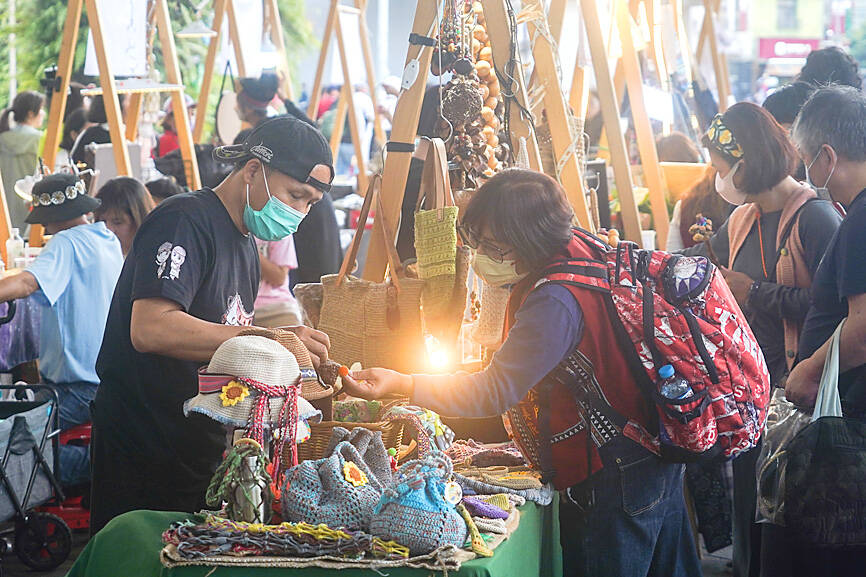Business confidence last month increased among manufacturers, service providers and construction firms, as non-tech product suppliers benefited from China’s post-pandemic opening while tech firms waited for a rebound, the Taiwan Institute of Economic Research (TIER, 台灣經濟研究院) said yesterday.
“Three consecutive months of upswings in sentiment signifies the worst is over and things would improve going forward,” TIER economist Gorden Sun (孫明德) said.
The sentiment gauge for the manufacturing industry picked up 3.12 points to 91.19, marking the fourth straight month of increases and suggesting that a recovery is around the corner, the Taipei-based think tank said, citing a monthly survey.

Photo: CNA
The ratio of firms that saw improved business last month gained 11.1 percentage points to 30.1 percent, while companies with business downturn fell 19.1 percentage points to 25.1 percent, it said.
Selling prices for steel, petrochemical and electrical products stabilized in the wake of China’s reopening, but demand for electronics and communication devices remained weak in the US and Europe, Sun said.
Electronics providers with a positive business outlook for the next six months dropped 1.2 percentage points to 33.9 percent, while firms with negative views gained 1.3 percentage points to 15.5 percent, it said.
Electronics vendors are heavyweights in Taiwan, as they supply 60 percent of the world’s chips.
Global semiconductor supply has gradually returned to healthy levels and demand for inventory replenishment should begin in the second half of this year, Sun said.
Taiwan’s semiconductor firms are international leaders and would continue to meet the needs of global clients, the economist said.
Manufacturers of non-tech products are more optimistic, with about 60 percent of chemical product suppliers expecting business improvement, it added.
The confidence reading for service providers added 3.21 points to 94.97, growing for two months in a row, it said.
Daily stock turnover regained some muscle, favorable for brokerage commissions and interest on income, it said.
However, business at retailers, hotels and restaurants cooled slightly after the holiday effect faded, it said.
The confidence measure rose 1.2 points to 93.31 for construction firms and property brokers, due to the government’s highway improvement projects, construction on technology parks and carbon emission-reducing projects by state-run enterprises, TIER said.
Property transactions are taking a hit from unfavorable policy and monetary tightening, it said, adding that buying interest is likely to stay weak after the central bank on Thursday raised interest rates for the fifth time and economic uncertainty lingers.

Taiwan Semiconductor Manufacturing Co (TSMC, 台積電) last week recorded an increase in the number of shareholders to the highest in almost eight months, despite its share price falling 3.38 percent from the previous week, Taiwan Stock Exchange data released on Saturday showed. As of Friday, TSMC had 1.88 million shareholders, the most since the week of April 25 and an increase of 31,870 from the previous week, the data showed. The number of shareholders jumped despite a drop of NT$50 (US$1.59), or 3.38 percent, in TSMC’s share price from a week earlier to NT$1,430, as investors took profits from their earlier gains

In a high-security Shenzhen laboratory, Chinese scientists have built what Washington has spent years trying to prevent: a prototype of a machine capable of producing the cutting-edge semiconductor chips that power artificial intelligence (AI), smartphones and weapons central to Western military dominance, Reuters has learned. Completed early this year and undergoing testing, the prototype fills nearly an entire factory floor. It was built by a team of former engineers from Dutch semiconductor giant ASML who reverse-engineered the company’s extreme ultraviolet lithography (EUV) machines, according to two people with knowledge of the project. EUV machines sit at the heart of a technological Cold

TAIWAN VALUE CHAIN: Foxtron is to fully own Luxgen following the transaction and it plans to launch a new electric model, the Foxtron Bria, in Taiwan next year Yulon Motor Co (裕隆汽車) yesterday said that its board of directors approved the disposal of its electric vehicle (EV) unit, Luxgen Motor Co (納智捷汽車), to Foxtron Vehicle Technologies Co (鴻華先進) for NT$787.6 million (US$24.98 million). Foxtron, a half-half joint venture between Yulon affiliate Hua-Chuang Automobile Information Technical Center Co (華創車電) and Hon Hai Precision Industry Co (鴻海精密), expects to wrap up the deal in the first quarter of next year. Foxtron would fully own Luxgen following the transaction, including five car distributing companies, outlets and all employees. The deal is subject to the approval of the Fair Trade Commission, Foxtron said. “Foxtron will be

INFLATION CONSIDERATION: The BOJ governor said that it would ‘keep making appropriate decisions’ and would adjust depending on the economy and prices The Bank of Japan (BOJ) yesterday raised its benchmark interest rate to the highest in 30 years and said more increases are in the pipeline if conditions allow, in a sign of growing conviction that it can attain the stable inflation target it has pursued for more than a decade. Bank of Japan Governor Kazuo Ueda’s policy board increased the rate by 0.2 percentage points to 0.75 percent, in a unanimous decision, the bank said in a statement. The central bank cited the rising likelihood of its economic outlook being realized. The rate change was expected by all 50 economists surveyed by Bloomberg. The